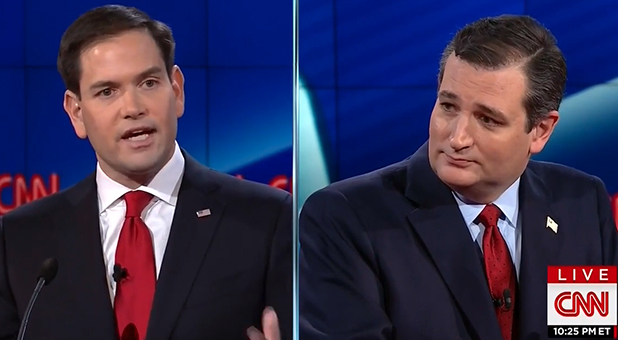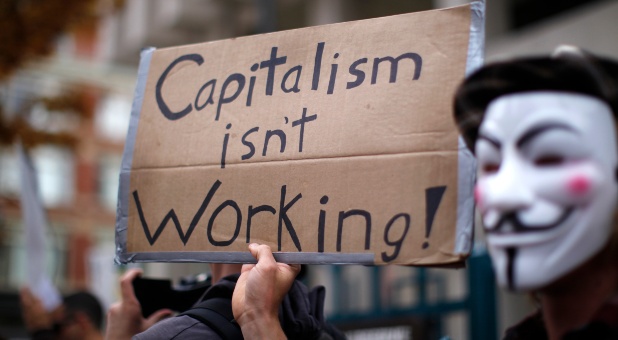In the political equivalent of he-said-he-said, Republican presidential candidates U.S. Sens. Marco Rubio (R-Fla.) and Ted Cruz (R-Texas) have been fighting over the issue of illegal immigration for the past several weeks.
That squabble took on a new dimension when it became one of the key headlines out of Tuesday night’s Republican presidential debate broadcast on CNN. And, like most he-said-he-said situations, the absolute truth is much too difficult to ascertain with audio-visual evidence alone.
The issue is rooted in Rubio’s involvement in the Gang of Eight immigration bill in 2013 that would have provided a “pathway to citizenship,” which many—including the senator himself—have declared code words for amnesty for illegals. The Cruz camp suggests Rubio’s involvement in the bill makes him soft on a key piece of the national security puzzle.
“First of all, earned path to citizenship is basically code for amnesty. It’s what they call it,” Rubio said during a Senate candidate debate in 2010. “And the reality of it is this: This has to do with the bottom line that America cannot be the only country in the world that does not enforce its immigration laws. It is unfair to the people that have legally entered this country to create an alternative pathway for individuals who entered illegally and knowingly did so.”
In his defense, the Rubio camp says the senator—knowing Sen. Harry Reid (D-Nev.) controlled the Senate—got the best deal he could with the Gang of Eight, hoping the Republican-controlled House of Representatives would make it better. The Cruz camp, instead, points to an interview in which another key member of the Gang of Eight, Sen. Charles Schumer (D-N.Y.), says Rubio was heavily involved in the bill’s creation.
“He was not only totally committed—he was in that room with us, four Democrats, four Republicans,” Schumer told CNN. “His fingerprints are all over that bill. It has a lot of Rubio imprints … He understood it, he molded it, he made it a tough path to citizenship. But we all agreed to it; it would have to be a tough path to citizenship. But he was all for it.”
Republican voters are overwhelmingly opposed to amnesty and direct citizenship for those who came to our country illegally. This issue is one that has hurt Rubio’s efforts to make inroads with grassroots conservatives across the U.S.
Recently, the Rubio camp has responded to attacks from Cruz surrogates by pointing to the Florida senator’s own comments about legalizing, without providing citizenship, the estimated 11 million illegals in the country. The claims were part of a heated exchange between Cruz and Rubio in Tuesday night’s debate.
“There was a battle over amnesty and some chose, like Senator Rubio, to stand with Barack Obama and Chuck Schumer,” Cruz said.
“I’m always puzzled about his attack on this issue,” Rubio responded. “Ted, you support legalizing people who are in this country illegally.”
“For Marco to suggest our records are the same is like suggesting the fireman and the arsonist have the same record because they are both at the scene of the fire,” Cruz replied.
Rubio then asked: “Does Ted Cruz rule out ever legalizing people that are in this country illegally now?”
At the center of this side of the squabble are comments Cruz made while advocating for one of several amendments to the Gang of Eight bill he offered. While the amendment offered by Cruz struck “pathway to citizenship” language, it left in the ability for illegals to attain legal status in the U.S.
“If this amendment is adopted to the current bill, the effect would that those 11 million under this current bill would still be eligible for RPI status,” he said during a June, 2013, Senate Judiciary Committee hearing. “They would still be eligible for legal status, and indeed under the terms of the bill, they would be eligible for LRP status, as well, so that they are out of the shadows, which the proponents of this bill repeatedly point to as their principle objective.”
“RPI status” meant “registered provisional immigrant,” which was the term used in the Gang of Eight bill for an illegal who has put himself on a legal pathway to obtaining a green card. “LPR status” is the official government term for an immigrant who has obtained a green card, becoming a “legal permanent resident.”
Cruz’s amendment also pushed for a 500-percent increase in H-1B “skilled worker” visas issued by the U.S.
“To truly fix our broken immigration system and take into account our nation’s economic needs, we must put more emphasis on increasing employment-based immigration. There is a current shortage of qualified high-skilled workers in the U.S., with an estimated 230,000 advanced-degree STEM jobs going unfilled by 2018,” he said at the time. “Additionally, more H-1B workers mean more jobs for American workers – according to a study by the American Enterprise Institute, for every additional 100 H-1B workers, 183 jobs are created for U.S. citizens.”
H-1B visas have instead had an opposite effect on the U.S. job market. This year, the number of U.S. companies that laid off American workers, replacing them with H1B visa applicants who work for less pay, made headlines.
In his defense, the Cruz camp says the senator was advocating a “poison pill” amendment in 2013 to point out the hypocrisy of those advocating for the bill. The activists’ goal, they say, was to secure citizenship “or else”—the latter meaning “or else” the U.S. border with Mexico would not be secured.
“Amanda Carpenter, who used to work for Ted Cruz in the Senate, explains why Ted Cruz ‘proposed’ the legalization of illegals during the Gang of 8 bill,” the pro-Cruz blog RightScoop said. “In short, it wasn’t that Cruz wanted to legalize illegals, but rather Cruz was brilliantly exposing how the Gang of 8 bill was all about a path to citizenship and not fixing the immigration system and border enforcement as the Gang of 8 would have had you believe.”
At the end of the day, the voters will ultimately decide who has won this argument. Did Rubio advocate for amnesty? Did Cruz advocate for legalization? Is this a case of a distinction without a difference?
Like beauty, in cases such as this, the truth is in the eye of the beholder.
See an error in this article?
To contact us or to submit an article




















